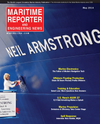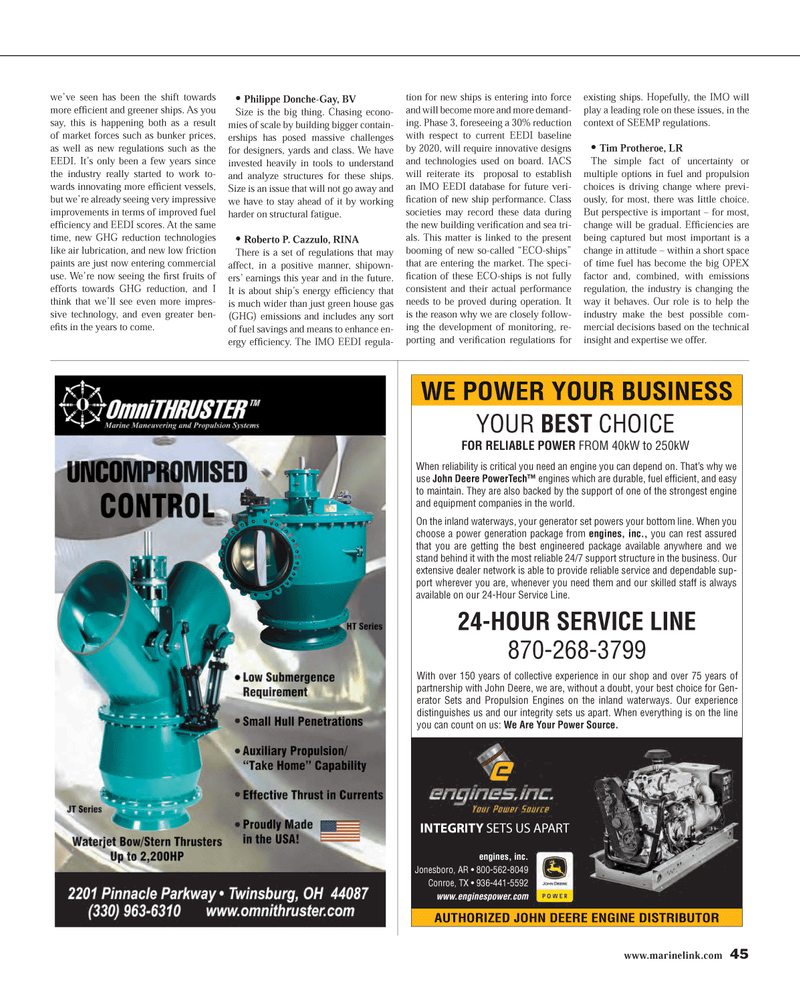
Page 45: of Maritime Reporter Magazine (May 2014)
Marine Electronics Edition
Read this page in Pdf, Flash or Html5 edition of May 2014 Maritime Reporter Magazine
www.marinelink.com 45
YOUR BEST CHOICE
FOR RELIABLE POWER FROM 40kW to 250kW
When reliability is critical you need an engine you can depend on. That’s why we use John Deere PowerTech™ engines which are durable, fuel effi cient, and easy to maintain. They are also backed by the support of one of the strongest engine and equipment companies in the world.
On the inland waterways, your generator set powers your bottom line. When you choose a power generation package from engines, inc., you can rest assured that you are getting the best engineered package available anywhere and we stand behind it with the most reliable 24/7 support structure in the business. Our extensive dealer network is able to provide reliable service and dependable sup- port wherever you are, whenever you need them and our skilled staff is always available on our 24-Hour Service Line. 24-HOUR SERVICE LINE 870-268-3799
With over 150 years of collective experience in our shop and over 75 years of partnership with John Deere, we are, without a doubt, your best choice for Gen- erator Sets and Propulsion Engines on the inland waterways. Our experience distinguishes us and our integrity sets us apart. When everything is on the line you can count on us: We Are Your Power Source.
AUTHORIZED JOHN DEERE ENGINE DISTRIBUTOR
WE POWER YOUR BUSINESS engines, inc.
Jonesboro, AR • 800-562-8049
Conroe, TX • 936-441-5592 www.enginespower.com
INTEGRITY SETS US APART
Engines Inc MR May14.indd 1 5/2/2014 11:29:39 AM we’ve seen has been the shift towards more effi cient and greener ships. As you say, this is happening both as a result of market forces such as bunker prices, as well as new regulations such as the
EEDI. It’s only been a few years since the industry really started to work to- wards innovating more effi cient vessels, but we’re already seeing very impressive improvements in terms of improved fuel effi ciency and EEDI scores. At the same time, new GHG reduction technologies like air lubrication, and new low friction paints are just now entering commercial use. We’re now seeing the fi rst fruits of efforts towards GHG reduction, and I think that we’ll see even more impres- sive technology, and even greater ben- efi ts in the years to come. Philippe Donche-Gay, BV
Size is the big thing. Chasing econo- mies of scale by building bigger contain- erships has posed massive challenges for designers, yards and class. We have invested heavily in tools to understand and analyze structures for these ships.
Size is an issue that will not go away and we have to stay ahead of it by working harder on structural fatigue. Roberto P. Cazzulo, RINA
There is a set of regulations that may affect, in a positive manner, shipown- ers’ earnings this year and in the future.
It is about ship’s energy effi ciency that is much wider than just green house gas (GHG) emissions and includes any sort of fuel savings and means to enhance en- ergy effi ciency. The IMO EEDI regula- tion for new ships is entering into force and will become more and more demand- ing. Phase 3, foreseeing a 30% reduction with respect to current EEDI baseline by 2020, will require innovative designs and technologies used on board. IACS will reiterate its proposal to establish an IMO EEDI database for future veri- fi cation of new ship performance. Class societies may record these data during the new building verifi cation and sea tri- als. This matter is linked to the present booming of new so-called “ECO-ships” that are entering the market. The speci- fi cation of these ECO-ships is not fully consistent and their actual performance needs to be proved during operation. It is the reason why we are closely follow- ing the development of monitoring, re- porting and verifi cation regulations for existing ships. Hopefully, the IMO will play a leading role on these issues, in the context of SEEMP regulations. Tim Protheroe, LR
The simple fact of uncertainty or multiple options in fuel and propulsion choices is driving change where previ- ously, for most, there was little choice.
But perspective is important – for most, change will be gradual. Effi ciencies are being captured but most important is a change in attitude – within a short space of time fuel has become the big OPEX factor and, combined, with emissions regulation, the industry is changing the way it behaves. Our role is to help the industry make the best possible com- mercial decisions based on the technical insight and expertise we offer.
MR #5 (42-49).indd 45 5/2/2014 11:32:08 AM

 44
44

 46
46
